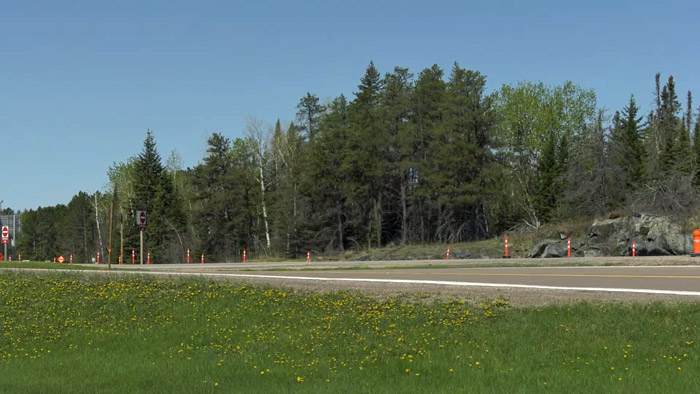Work is now underway as the Manitoba government begins its next steps on twinning the Trans-Canada Highway from Falcon Lake to Manitoba-Ontario border.
“It is important for Manitobans to have safe and reliable highways to get around this great province of ours and also to get to neighbouring provinces,” said Premier Heather Stefanson. “That is why we have prioritized this work as it not only serves as a key trade route, but is one of the busiest stretches of highways especially during the summer months for cottagers and travellers.
The Manitoba government has committed to four lanes of traffic on the Trans-Canada Highway between Falcon Lake and the Manitoba-Ontario border and has prioritized twinning 700 metres of the highway nearest the border to align with Ontario’s new four-lane highway.
“Twinning the Trans-Canada Highway from Falcon Lake to the Manitoba-Ontario border will significantly improve safety for Manitobans and our government is committed to getting the job done,” said Stefanson.
Work is currently underway, including tree clearing and other activities that began last month with an anticipated completion by fall 2024.
The Manitoba government has also commissioned a conceptual design study for full 16-kilometre twinning project and following a competitive request for proposal process has selected Tetra Tech Canada Inc. to complete the study.
“As a major corridor of the national highway system, the Trans-Canada Highway is essential for Manitoba’s communities and the province’s trade and tourism industries,” said Transportation and Infrastructure Minister Doyle Piwniuk. “The 16-kilometre section from Falcon Lake to the Manitoba-Ontario border is the only remaining stretch not yet twinned. Our government is committed to upgrading this important east-west link to improve public safety, enhance the reliability and efficiency of interprovincial and international commerce, and enable future development.”
The conceptual design study will include:
- route options for the four lanes on the existing alignment or on a new alignment;
- designs for new or modified interchanges at Provincial Road (PR) 301 and Provincial Trunk Highway (PTH) 44;options to eliminate three remaining intersections;
- access requirements at Hunt and Lyons lakes;
- options for replacing the existing flyover at PR 301; and
- assess additional interchanges or grade separations that may be required at additional locations.
The conceptual design study will take approximately two years to complete, with functional and detailed design studies commissioned as the project progresses. All studies will include consultation with Indigenous rights holders, and engagement with land and business owners, the public, and stakeholders, to develop a full understanding of the project’s implications, noted Piwniuk.
Survey crews are expected at the site in the coming weeks. These surveys, which will include the use of drone survey equipment, are needed to learn about existing conditions while engaging local stakeholders and communities to better inform potential design alternatives.
“The Trans-Canada Highway is a vital trade and transportation corridor for the entire country, and I am pleased to see the Manitoba government is taking this important step forward to make the highway even safer and more accessible for travellers,” said Ontario Transportation Minister Caroline Mulroney. “Ontario and Manitoba share a common goal to keep people and our goods moving and widening the Trans-Canada Highway will help achieve this, while boosting our economies.”
“The Manitoba Trucking Association welcomes this announcement and we look forward to the completion of this project”, said Aaron Dolyniuk, executive director, Manitoba Trucking Association. “This road improvement will have a positive impact on all road users. It will improve road safety not only for Manitoba’s trucking companies, but all carriers who operate across Canada, as well as the general public.”
The project to twin the Trans-Canada Highway is one of the major capital projects detailed in the recently released 2023 Multi-year Infrastructure Investment Strategy, noted Piwniuk.
Along with the twinning, the Manitoba government is also planning to invest over $10 million for improvements on the existing Trans-Canada Highway in the interim including:
- structure rehabilitation on the Trans-Canada Highway over the Falcon Lake access road;
- structure rehabilitation over Falcon Lake Road in Whiteshell Provincial Park; and
- structure rehabilitation over PTH 44 into the community of West Hawk Lake.
The 2023 Multi-year Infrastructure Investment Strategy can be viewed online at gov.mb.ca.




